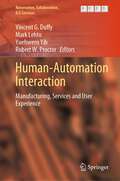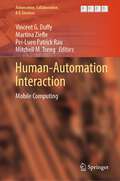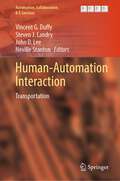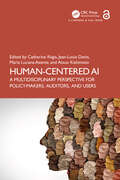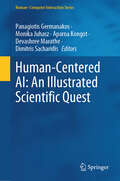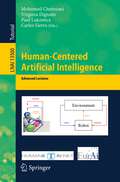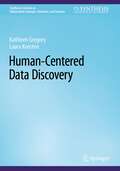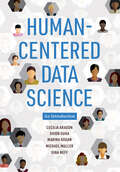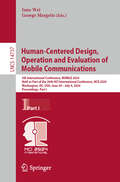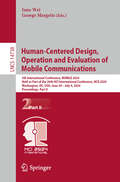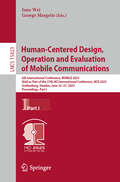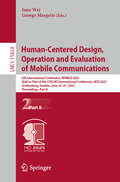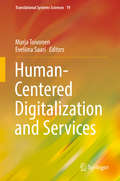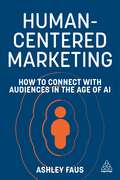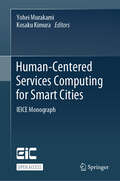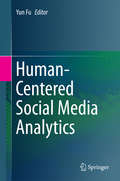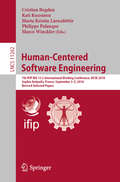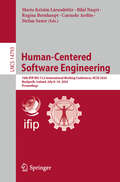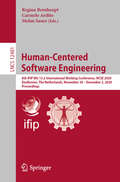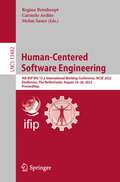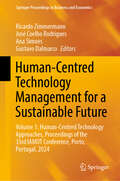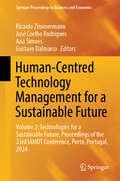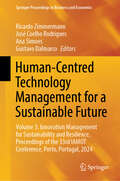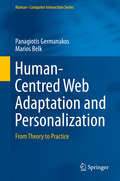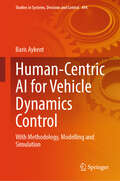- Table View
- List View
Human-Automation Interaction: Manufacturing, Services and User Experience (Automation, Collaboration, & E-Services #10)
by Robert W. Proctor Vincent G. Duffy Yuehwern Yih Mark LehtoThis book provides practical guidance and awareness for a growing body of knowledge developing across a variety of disciplines and many countries. This book is a celebration of the Gavriel Salvendy International Symposium (GSIS) and provides a survey of topics and emerging areas of interest in human–automation interaction. This book for the GSIS emphasizes main thematic areas: manufacturing, services and user experience. Main areas of coverage include Section A: Advanced Production Management and Production Control; Section B: Healthcare Automation; Section C: Measuring and Modeling Human Performance; Section D: Usability and User Experience; Section E: Safety Management and Occupational Ergonomics; Section F: Manufacturing and Services; Section G: Data and Probabilistic Information; Section H: Training and Collaboration Technologies. Contributions from especially early career researchers were featured as part of this (virtual) symposium and celebration. Gavriel Salvendy initiated the conferences that run annually as Human–Computer Interaction International and Applied Human Factors and Ergonomics International (AHFE), both within the Lecture Notes in Springer. The book is inclusive of human–computer interaction and human factors and ergonomics principles, yet it is intended to serve a much wider audience that has interest in automation and human modeling. The emerging need for human–automation interaction expertise has developed from an ever-growing availability and presence of automation in our everyday lives.
Human-Automation Interaction: Mobile Computing (Automation, Collaboration, & E-Services #12)
by Martina Ziefle Vincent G. Duffy Pei-Luen Patrick Rau Mitchell M. TsengThis book provides practical guidance and awareness for a growing body of knowledge developing across a variety of disciplines. This initiative is a celebration of the Gavriel Salvendy International Symposium (GSIS) and provides a survey of topics and emerging areas of interest in human–automation interaction. This set of articles for the GSIS emphasizes a main thematic areas: mobile computing. Main areas of coverage include Section A: Health, Care and Assistive Technologies; Section B: Usability, User Experience and Design; Section C: Virtual Learning, Training and Collaboration; Section D: Ergonomics in Work, Automation and Production. In total, there are more than 600 pages emphasizing contributions from especially early career researchers that were featured as part of this (virtual) symposium and celebration. Gavriel Salvendy initiated the conferences that run annually as Human–Computer Interaction within LNCS of Springer and Applied Human Factors and Ergonomics International (AHFE). The book is inclusive of human–computer interaction and human factors and ergonomics principles, yet is intended to serve a much wider audience that has interest in automation and human modeling. The emerging need for human–automation interaction expertise has developed from an ever-growing availability and presence of automation in our everyday lives. This initiative is intended to provide practical guidance and awareness for a growing body of knowledge developing across a variety of disciplines and many countries.
Human-Automation Interaction: Transportation (Automation, Collaboration, & E-Services #11)
by John D. Lee Vincent G. Duffy Neville Stanton Steven J. LandryThis book provides practical guidance and awareness for a growing body of knowledge developing across a variety of disciplines. This initiative is a celebration of the Gavriel Salvendy International Symposium (GSIS) and provides a survey of topics and emerging areas of interest in human–automation interaction. This set of articles for the GSIS emphasizes a main thematic area: transportation. Main areas of coverage include Section A: Interaction with Vehicle Automation; Section B: HCI in Automated Vehicles; Section C: Trust in Vehicle Automation; Section D: Physical Modeling of Vehicle Cabs; Section E: Task Simulation Automation via Digital Human Models; Section F: Maintenance and Manufacturing; Section G: Smart Cities and Connected Vehicles. Contributions from especially early career researchers were featured as part of this (virtual) symposium and celebration. Gavriel Salvendy initiated the conferences that run annually as Human–Computer Interaction within LNCS of Springer and Applied Human Factors and Ergonomics International (AHFE). The book is inclusive of human–computer interaction and human factors and ergonomics principles, yet it is intended to serve a much wider audience that has interest in automation and human modeling. The emerging need for human–automation interaction expertise has developed from an ever-growing availability and presence of automation in our everyday lives. This initiative is intended to provide practical guidance and awareness for a growing body of knowledge developing across a variety of disciplines and many countries.
Human-Centered AI: A Multidisciplinary Perspective for Policy-Makers, Auditors, and Users (Chapman & Hall/CRC Artificial Intelligence and Robotics Series)
by Jean-Louis Denis Catherine Régis Maria Luciana Axente Atsuo KishimotoArtificial intelligence (AI) permeates our lives in a growing number of ways. Relying solely on traditional, technology-driven approaches won't suffice to develop and deploy that technology in a way that truly enhances human experience. A new concept is desperately needed to reach that goal. That concept is Human-Centered AI (HCAI).With 29 captivating chapters, this book delves deep into the realm of HCAI. In Section I, it demystifies HCAI, exploring cutting-edge trends and approaches in its study, including the moral landscape of Large Language Models. Section II looks at how HCAI is viewed in different institutions—like the justice system, health system, and higher education—and how it could affect them. It examines how crafting HCAI could lead to better work. Section III offers practical insights and successful strategies to transform HCAI from theory to reality, for example, studying how using regulatory sandboxes could ensure the development of age-appropriate AI for kids. Finally, decision-makers and practitioners provide invaluable perspectives throughout the book, showcasing the real-world significance of its articles beyond academia.Authored by experts from a variety of backgrounds, sectors, disciplines, and countries, this engaging book offers a fascinating exploration of Human-Centered AI. Whether you're new to the subject or not, a decision-maker, a practitioner or simply an AI user, this book will help you gain a better understanding of HCAI's impact on our societies, and of why and how AI should really be developed and deployed in a human-centered future.
Human-Centered AI: An Illustrated Scientific Quest (Human–Computer Interaction Series)
by Panagiotis Germanakos Monika Juhasz Aparna Kongot Devashree Marathe Dimitris SacharidisEmbark on a captivating exploration of human-centered computing and AI, where the convergence of technology and human interaction unveils a world of endless possibilities. In the age of wireless communication, pervasive computing, and the Internet of Things, the synergy between humans and machines has never been more profound. This book delves deep into the heart of this symbiotic relationship, shedding light on the intricate dynamics that define our digital landscape. From the humble human-computer communications, via simple interaction points, to the complex web of virtual networks, every aspect of this journey is meticulously examined. Through a lens of innovation and insight, we navigate within the complex terrain of user actions, individual differences, and algorithmic computations. At the core of our exploration lies a quest for understanding—a quest that transcends the boundaries of traditional research and ventures into the realm of cutting-edge technology. Special emphasis is placed on promoting original insights and paradigms, incorporating aspects derived from psychological theory and individual differences in adaptive computational systems and recommenders. Our goal is simple yet ambitious: by enhancing explainability, fairness, transparency, and decreasing bias during interactions, to empower users with greater control and understanding of the technologies that shape their lives. Through a blend of visual storytelling and specialized textual contributions, we invite you to join us on this extraordinary journey. Whether you're a researcher, practitioner, or enthusiast in the field of AI and human-computer interaction, this book offers valuable insights and perspectives. Prepare to be inspired, enlightened, and empowered through this transformative journey as we unlock the true potential of technology in service of humanity.
Human-Centered Artificial Intelligence: Advanced Lectures (Lecture Notes in Computer Science #13500)
by Virginia Dignum Carles Sierra Mohamed Chetouani Paul LukowiczThe 18th European Advanced Course on AI (ACAI) took place in Berlin on 11-15 October 2021, organized by the European project Humane-AI Net in collaboration with the European AI Association (EURAI). The school included tutorials on different topics, which were selected through an open call to top European AI researchers. In addition, the school also included 4 invited talks, a student poster presentation, and a mentorship program. This volume contains 21 tutorial chapters organized according to the following themes: human-centered AI; human-centered machine learning; explainable AI; ethics, law, and the societal aspects of AI; argumentation; and social simulation. The contributions include learning objectives, reading lists, and links to further resources.
Human-Centered Data Discovery (Synthesis Lectures on Information Concepts, Retrieval, and Services)
by Kathleen Gregory Laura KoestenThis book synthesizes existing research on human-centered data discovery, as well as the recommendations which exist for supporting the design of sustainable, user-centered data search systems. While information-seeking in various settings has been well-researched within computer and information science, not much is known about human-centered data discovery, or how people discover, understand and interact with data that others create. This is particularly relevant given the ever-increasing amounts of data being produced and made available, and the creation of data-specific discovery tools and systems. This book examines how people find the data they need, which search strategies and tools they use, how they understand data, and how search systems can be better designed to meet people’s needs.
Human-Centered Data Science: An Introduction
by Gina Neff Michael Muller Cecilia Aragon Shion Guha Marina KoganBest practices for addressing the bias and inequality that may result from the automated collection, analysis, and distribution of large datasets.Human-centered data science is a new interdisciplinary field that draws from human-computer interaction, social science, statistics, and computational techniques. This book, written by founders of the field, introduces best practices for addressing the bias and inequality that may result from the automated collection, analysis, and distribution of very large datasets. It offers a brief and accessible overview of many common statistical and algorithmic data science techniques, explains human-centered approaches to data science problems, and presents practical guidelines and real-world case studies to help readers apply these methods. The authors explain how data scientists&’ choices are involved at every stage of the data science workflow—and show how a human-centered approach can enhance each one, by making the process more transparent, asking questions, and considering the social context of the data. They describe how tools from social science might be incorporated into data science practices, discuss different types of collaboration, and consider data storytelling through visualization. The book shows that data science practitioners can build rigorous and ethical algorithms and design projects that use cutting-edge computational tools and address social concerns.
Human-Centered Design, Operation and Evaluation of Mobile Communications: 5th International Conference, MOBILE 2024, Held as Part of the 26th HCI International Conference, HCII 2024, Washington, DC, USA, June 29–July 4, 2024, Proceedings, Part I (Lecture Notes in Computer Science #14737)
by June Wei George MargetisThis book constitutes the refereed proceedings of the 5th International Conference on Design, Operation and Evaluation of Mobile Communications, MOBILE 2024, held as part of the 26th International Conference, HCI International 2024, which was held in Washington, DC, USA, during June 29-July 4, 2024. The total of 1271 papers and 309 posters included in the HCII 2024 proceedings was carefully reviewed and selected from 5108 submissions. The MOBILE 2024 proceedings were organized in the following topical sections: Part I: Mobile health and wellbeing; mobile applications, serious games and advanced interfaces; Part II: Mobile commerce, marketing and retail; mobile security, privacy, and safety; mobile user experience and design.
Human-Centered Design, Operation and Evaluation of Mobile Communications: 5th International Conference, MOBILE 2024, Held as Part of the 26th HCI International Conference, HCII 2024, Washington, DC, USA, June 29–July 4, 2024, Proceedings, Part II (Lecture Notes in Computer Science #14738)
by June Wei George MargetisThis book constitutes the refereed proceedings of the 5th International Conference on Design, Operation and Evaluation of Mobile Communications, MOBILE 2024, held as part of the 26th International Conference, HCI International 2024, which was held in Washington, DC, USA, during June 29-July 4, 2024. The total of 1271 papers and 309 posters included in the HCII 2024 proceedings was carefully reviewed and selected from 5108 submissions. The MOBILE 2024 proceedings were organized in the following topical sections: Part I: Mobile health and wellbeing; mobile applications, serious games and advanced interfaces; Part II: Mobile commerce, marketing and retail; mobile security, privacy, and safety; mobile user experience and design.
Human-Centered Design, Operation and Evaluation of Mobile Communications: 6th International Conference, MOBILE 2025, Held as Part of the 27th HCI International Conference, HCII 2025, Gothenburg, Sweden, June 22–27, 2025, Proceedings, Part I (Lecture Notes in Computer Science #15823)
by June Wei George MargetisThis book constitutes the refereed proceedings of the 6th International Conference on Design, Operation and Evaluation of Mobile Communications, MOBILE 2025, held as part of the 27th International Conference, HCI International 2025, which was held in Gothenburg, Sweden, during June 22–27, 2025. The total of 1430 papers and 355 posters included in the HCII 2025 proceedings was carefully reviewed and selected from 7972 submissions. The MOBILE 2025 proceedings were organized in the following topical sections- Mobile Usability, Experience and Personalization; Mobile Health, Inclusivity and Well-Being; Mobile Security, Protection and Risk Assessment; and, Mobile Applications for Culture, and Social Engagement.
Human-Centered Design, Operation and Evaluation of Mobile Communications: 6th International Conference, MOBILE 2025, Held as Part of the 27th HCI International Conference, HCII 2025, Gothenburg, Sweden, June 22–27, 2025, Proceedings, Part II (Lecture Notes in Computer Science #15824)
by June Wei George MargetisThis book constitutes the refereed proceedings of the 6th International Conference on Design, Operation and Evaluation of Mobile Communications, MOBILE 2025, held as part of the 27th International Conference, HCI International 2025, which was held in Gothenburg, Sweden, during June 22–27, 2025. The total of 1430 papers and 355 posters included in the HCII 2025 proceedings was carefully reviewed and selected from 7972 submissions. The MOBILE 2025 proceedings were organized in the following topical sections- Mobile Usability, Experience and Personalization; Mobile Health, Inclusivity and Well-Being; Mobile Security, Protection and Risk Assessment; and, Mobile Applications for Culture, and Social Engagement.
Human-Centered Digitalization and Services (Translational Systems Sciences #19)
by Marja Toivonen Eveliina SaariThis book provides a timely overview of the impacts of digitalization from the perspective of everyday life, and argues that one central issue in digitalization is the development of new types of services that digitalization enables, but which are often overlooked due to the focus on new technologies and devices. The book summarizes the past 20 years of research into the relationship between information and communications technology (ICT) and service innovation, and reveals that the ongoing digitalization is a qualitatively different phenomenon and represents a true paradigm shift.The all-encompassing integration and distribution of data raises critical issues such as preserving human dignity and individual autonomy; moreover, interaction practices that foster broad participation, trust, learning, and a willingness to share knowledge are called for. Citizen empowerment and multi-actor co-creation have become central to using digitalization to support the development of wellbeing and sustainability.Further, the book shows how employees and professionals can and should be involved in designing their future work, and in evaluating it. Proactiveness and participation in innovation endeavours are ways to guarantee meaningful work in an age of socio-technical transition.The book employs a variety of theoretical approaches and perspectives from diverse disciplines to illustrate these needs. In addition to theoretical analyses, some specific application areas are examined, e.g. services in health and social care, and problems linked to robots in elderly care. Given its scope, the book is highly recommended to all readers seeking an overview of the current understanding of the human side of digitalization and searching for concrete cases from different countries to illustrate the topic.
Human-Centered Marketing: How to Connect with Audiences in the Age of AI
by Ashley FausWith the rise of AI, excess of distribution channels, and focus on tracking every touchpoint in order to drive revenue, consumer trust is at an all-time low. To restore trust, brands need to create delightful, seamless, and impactful journeys to connect with the humans behind the screen.Human-Centered Marketing introduces three frameworks to help mid-senior-level marketers find, connect with, and convert audiences. The book helps you map an audience journey that behaves like a playground instead of a linear funnel, evolve the approach to social media to go beyond conversations and instead facilitate and engage with the community and build thought leaders, to build trust and move your audience into the future.Each chapter includes practical advice to help seasoned marketers shift their strategy and offers tactical implementation recommendations. All chapters include real-world examples from companies like Adobe, Hubspot, and Edelman to demonstrate that this shift from the standard playbook actually works.
Human-Centered Services Computing for Smart Cities: IEICE Monograph
by Yohei Murakami Kosaku KimuraThis open-access book compiles seven monographs from researchers at the forefront of services computing and artificial intelligence for smart cities. This is structured into three thematic parts: service composition, big data analysis, and service integration for smart cities.The first part describes service compositions for smart cities, where interaction between services and the physical world, including humans, is paramount, unlike services on the Web and clouds. The second part addresses the challenges of big data analytics in smart cities, with a focus on privacy-preserving methodologies. The third part reports human-centered service integration for applications in smart cities.
Human-Centered Social Media Analytics
by Yun FuThis book provides a timely and unique survey of next-generation social computational methodologies. The text explains the fundamentals of this field, and describes state-of-the-art methods for inferring social status, relationships, preferences, intentions, personalities, needs, and lifestyles from human information in unconstrained visual data. Topics and features: includes perspectives from an international and interdisciplinary selection of pre-eminent authorities; presents balanced coverage of both detailed theoretical analysis and real-world applications; examines social relationships in human-centered media for the development of socially-aware video, location-based, and multimedia applications; reviews techniques for recognizing the social roles played by people in an event, and for classifying human-object interaction activities; discusses the prediction and recognition of human attributes via social media analytics, including social relationships, facial age and beauty, and occupation.
Human-Centered Software Engineering (Lecture Notes in Computer Science #8742)
by Cristian Bogdan Marco Winckler Philippe Palanque Kati Kuusinen Marta Kristín LárusdóttirThis book constitutes the refereed post-conference proceedings of the 7th IFIP WG 13.2 International Conference on Human-Centered Software Engineering, HCSE 2018, held in Sophia Antipolis, France, in September 2018. The 11 full papers and 7 short papers presented together with 5 poster and demo papers were carefully reviewed and selected from 36 submissions. The papers focus on the interdependencies between user interface properties and contribute to the development of theories, methods, tools and approaches for dealing with multiple properties that should be taken into account when developing interactive systems. They are organized in the following topical sections: HCI education and training; model-based and model-driven approaches; task modeling and task-based approaches; tools and tool support; and usability evaluation and UI testing.
Human-Centered Software Engineering: 10th IFIP WG 13.2 International Working Conference, HCSE 2024, Reykjavik, Iceland, July 8–10, 2024, Proceedings (Lecture Notes in Computer Science #14793)
by Regina Bernhaupt Stefan Sauer Marta Kristín Lárusdóttir Bilal Naqvi Carmelo ArditoThis book constitutes the refereed proceedings of the 10th IFIP WG 13.2 International Working Conference on Human-Centered Software Engineering, HCSE 2024, held in Reykjavik, Finland, during Iceland, July 8–10, 2024. The 11 full papers with 5 poster, 4 demos and 3 PhD forum papers were carefully selected from 36 submissions. HCSE 2024 conference and papers focused on recurring topics such as innovative methods for human-centered and participatory design and software engineering, modeling approaches, usable security, and the balancing of multiple properties in the development, but also on emerging areas like immersive environments and augmented/virtual/mixed reality, low-code development and human-centered AI.
Human-Centered Software Engineering: 8th IFIP WG 13.2 International Working Conference, HCSE 2020, Eindhoven, The Netherlands, November 30 – December 2, 2020, Proceedings (Lecture Notes in Computer Science #12481)
by Regina Bernhaupt Stefan Sauer Carmelo ArditoThis book constitutes the refereed conference proceedings of the 8th IFIP WG 13.2 International Conference on Human-Centered Software Engineering, HCSE 2020, which was supposed to be held in Eindhoven, The Netherlands, in November/December 2020, was instead held virtually due to the COVID-19 pandemic.The 10 full papers and 5 short poster and demo papers presented together with 5 poster and demo papers were carefully reviewed and selected from 33 submissions. The papers focus on the interdependencies between user interface properties and contribute to the development of theories, methods, tools and approaches for dealing with multiple properties that should be taken into account when developing interactive systems. They are organized in the following topical sections: user-centred design approaches; model-based and model-driven approaches; software development strategies; and posters and demos.
Human-Centered Software Engineering: 9th IFIP WG 13.2 International Working Conference, HCSE 2022, Eindhoven, The Netherlands, August 24–26, 2022, Proceedings (Lecture Notes in Computer Science #13482)
by Regina Bernhaupt Stefan Sauer Carmelo ArditoThis book constitutes the refereed conference proceedings of the 9th IFIP WG 13.2 International Conference on Human-Centered Software Engineering, HCSE 2022, which was held in Eindhoven, The Netherlands, during August 2022. The 11 full papers presented together with 2 poster and demo papers were carefully reviewed and selected from 25 submissions. The papers focus on the interdependencies between user interface properties and contribute to the development of theories, methods, tools and approaches for dealing with multiple properties that should be taken into account when developing interactive systems. They are organized in the following topical sections: user-centred design approaches; model-based and model-driven approaches; software development strategies; and posters and demos.
Human-Centred Technology Management for a Sustainable Future: Volume 1: Human-Centred Technology Approaches, Proceedings of the 33rd IAMOT Conference, Porto, Portugal, 2024 (Springer Proceedings in Business and Economics)
by Gustavo Dalmarco Ricardo Zimmermann José Coelho Rodrigues Ana SimoesThis proceedings volume contains selected papers from the 33rd International Association for Management of Technology (IAMOT) Conference, held from July 8-11, 2024, in Porto, Portugal. It is the second volume of a three-volume set of conference proceedings focused on technologies for a sustainable future. The book explores the challenges and opportunities in today's social and business landscapes, delving into innovative and disruptive concepts. With a special emphasis on the role of technologies, it sheds light on how they enable novel approaches to address current issues. The volume demonstrates that, following the principles of Industry 5.0, technologies can go far beyond productivity and economic gains, contributing to the benefit and comfort of human workers. It also elucidates the necessity of adopting a human-centered approach in utilizing technology to adapt production processes to workers' needs, while ensuring that the implementation of new technologies does not infringe upon the fundamental rights of workers.
Human-Centred Technology Management for a Sustainable Future: Volume 2: Technologies for a Sustainable Future, Proceedings of the 33rd IAMOT Conference, Porto, Portugal, 2024 (Springer Proceedings in Business and Economics)
by Gustavo Dalmarco Ricardo Zimmermann José Coelho Rodrigues Ana SimoesThis proceedings volume contains selected papers from the 33rd International Association for Management of Technology (IAMOT) Conference, held from July 8-11, 2024, in Porto, Portugal. It is the second volume of a three-volume set of conference proceedings focused on technologies for a sustainable future. The book explores the challenges and opportunities in today's social and business landscapes, delving into innovative and disruptive concepts. With a special emphasis on the role of technologies, it sheds light on how they enable novel approaches to address current issues. The volume demonstrates that, following the principles of Industry 5.0, technologies can go far beyond productivity and economic gains, contributing to the benefit and comfort of human workers. It also elucidates the necessity of adopting a human-centered approach in utilizing technology to adapt production processes to workers' needs, while ensuring that the implementation of new technologies does not infringe upon the fundamental rights of workers.
Human-Centred Technology Management for a Sustainable Future: Volume 3: Innovation Management for Sustainability and Resilience, Proceedings of the 33rd IAMOT Conference, Porto, Portugal, 2024 (Springer Proceedings in Business and Economics)
by Gustavo Dalmarco Ricardo Zimmermann José Coelho Rodrigues Ana SimoesThis proceedings volume contains selected papers from the 33rd International Association for Management of Technology (IAMOT) Conference, held from July 8-11, 2024, in Porto, Portugal. It is the second volume of a three-volume set of conference proceedings focused on technologies for a sustainable future. The book explores the challenges and opportunities in today's social and business landscapes, delving into innovative and disruptive concepts. With a special emphasis on the role of technologies, it sheds light on how they enable novel approaches to address current issues. The volume demonstrates that, following the principles of Industry 5.0, technologies can go far beyond productivity and economic gains, contributing to the benefit and comfort of human workers. It also elucidates the necessity of adopting a human-centered approach in utilizing technology to adapt production processes to workers' needs, while ensuring that the implementation of new technologies does not infringe upon the fundamental rights of workers.
Human-Centred Web Adaptation and Personalization
by Panagiotis Germanakos Marios BelkThis book focuses on theimportance of adaptation and personalization in today's society and theupgraded role computational systems and the Internet play in our day-to-dayactivities. In this era of wireless communication, pervasive computing and the Internet of Things, it is becoming increasingly critical to ensure humans remain central in the developmental process of new technologies to guarantee their continued usefulness and a positive end-user experience. Organized into three clear parts - theory, principles and practice, a holistic approach to designing and developing adaptive interactive systems and services has been adopted. With an emphasis on distinct human factors, both basic and applied research topics are explored, extending from human-centred user models, driven by user's individual differences in cognitive processing and emotions, to the creation of smart interfaces that can handle the ever increasing volume and complexity of information to the benefit of the end-user. Human-Centred Web Adaptation and Personalization - From Theory to Practice is meticulously crafted to serve researchers, practitioners, and students who wish to have an end-to-end understanding of how to convert pure research and scientific results into viable user interfaces, system components and applications. It will serve to bridge the knowledge gap that still remains by suggesting interaction design and implementation guidelines for areas like E-Commerce, E-Learning and Usable Security.
Human-Centric AI for Vehicle Dynamics Control: With Methodology, Modelling and Simulation (Studies in Systems, Decision and Control #494)
by Baris AykentThis book approaches its subject matter by merging advanced AI techniques with traditional vehicle dynamics control. It emphasizes human-centric design to improve safety, comfort, and personalization in automotive systems like active front steering (AFS) and electronic stability control (ESC). What’s new is its focus on human-centric AI, integrating adaptive systems that anticipate driver intent and balance automation with user engagement. The book spans from basic vehicle dynamics to AI-powered methods, targeting engineers, researchers, and students. It’s key for designing, testing, and optimizing control systems while addressing future challenges in autonomous and connected vehicles.
